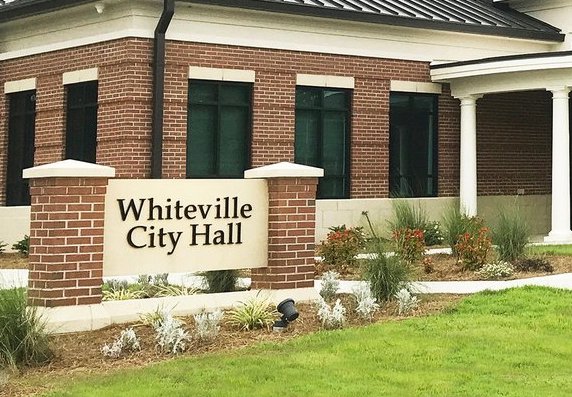As Hurricane Helene tore its way through Western North Carolina last Friday, City of Whiteville employees were put on notice that some would be deployed to help with disaster recovery.
Seven days later, some of those city personnel are still waiting on permission from the county to help.
“My staff and I are frustrated with the disconnect,” City Manager Darren Currie said in an email today (Oct. 4). “We can’t get in contact with the county EM (David Ransom) to make sure we are entered, and we do not have access to WEB EOC, the emergency management system used by the state.
“All the (county) staff is deployed I guess, which is okay, but who is looking after the home front?”
“The process for us to deploy is that we must submit any requests or offers for assistance to our County Emergency Manager, and it is processed to the State EM,” Whiteville Emergency Services Director Hal Lowder Jr. said. “We did that last Friday and have not received a mission number nor any communication regarding our offers.”
Lowder said that as soon as Helene’s path was clear, he conferred with the city fire and police departments, which were already making preparations to head west. Lowder also notified Public Works Director Travis Faulk to have chain saws and crews ready to go. Faulk was instructed to make ready a dump truck, skid steer loader or excavator, and four personnel to help clear roadways for emergency and relief traffic.
“We have been in the situation where the roads were impossibly blocked,” Lowder explained.
Firefighters were already being dispatched via the Office of the State Fire Marshal, but a “strike team” of police officers and two patrol units were also ordered to be prepared to be gone for at least seven days.
“Several managers in the area would like our assistance,” Lowder said. “I spoke with (State) Sen. (Kevin) Corbin, and he was interested in our public works resources. We are told not to self-deploy, as we will not be reimbursed. There are other financial and liability issues with self-deployment and freelancing.” Corbin represents Cherokee, Clay, Graham, Haywood, Jackson, Macon, Swain and Transylvania counties, which are among those devastated by the storm.
Meanwhile, Columbus County has been deploying personnel and resources to several badly damaged areas.
Sheriff Bill Rogers worked with Bladen County Sheriff Jim McVicker to send out an additional four tractor trailer loads of donated supplies Wednesday to Bakersville.
County administration deployed a team including the manager, staff attorney, deputy fire marshal and others to the Asheville area Sunday. That team has assisted in tasks ranging from search and recovery to setting up then operating shelters. County Manager Eddie Madden said today that the county sent 500 feet of water pipe to the town of Black Mountain to help repair its water system, which helped bring the system back online Thursday.
County Emergency Management Director David Ransom arrived in Black Mountain Thursday with relief supplies and to assist recovery efforts. County Fire Mashal Shannon Blackmon delivered a badly needed mobile shower unit for staff and volunteers. More county employees are set to head west next week.
Some Whiteville City crews, however, are still in a holding pattern.
While the city has made it known they have resources, and managers in affected towns out west have gratefully accepted the offer, most of the Whiteville assets are still waiting to be deployed. The county essentially must allow the city to file with the state to send emergency assets to storm-ravaged areas, or the resources might not be protected.
City officials have asked the county to be given permission to head out, to no avail.
“It appears there is an overwhelming amount of offers/resource requests or something that is bogging down the system,” Lowder said.
Currie said staff with the Central Pines Council of Governments set up a virtual meeting with town officials in affected areas – the ones who had internet or telephone access – so local governments could know what was needed and where to send it.
The online “manager’s forum” was an opportunity for officials from out west to “pick the brains” of others in the east who had experienced hurricanes. Not all the local officials were able to take part due to a lack of communications in some areas.
Currie and Lowder are acting as “coaches”, assisting other municipalities in the hardhit areas with technical issues ranging from roads to water and sewer infrastructure. Currie offered up the city’s roster of what was available, but state and county officials have not given their blessing for the city to deploy – or a reason for the delay.
In addition to the public works and public safety resources, some city staff has been helping, Currie said.
The city’s Human Resources officer also assisting towns virtually with state and federal paperwork, and personnel needs. The city’s building inspector may be called on to assist with safety and code inspections of damaged buildings.
Among the public safety assets the city is offering are the Whiteville UAV Drone team, which is equipped for damage assessment and search and rescue, as well as help from the police department. The fire department and two Unmanned Aerial Vehicles (UAV)s are rotating back today from McDowell County.
While not technically a city department, the Whiteville Firefighter’s Auxiliary has also been instrumental in working with Black’s Tire to collect and ship donated supplies.
Affected local officials said that all the available assets were needed, but they had to be dispatched through the state Emergency Management office and then through the counties.
“On the conference call, folks needed the assistance we were offering,” Currie said. “(They) said put the resource in the WEB EOC to the state to get a mission and where to go.”
By being assigned a number and a specific destination and task, the city is covered for potential liability, and could be reimbursed for expenses related to the response. It also makes workers eligible for extra pay in some cases.
The county had not given the city a WEB EOC number or answered telephone calls and emails as of Friday (Oct. 4).
The lack of local communication has been frustrating, Currie said.
“Our problem is that all this must be originated at the local level,” he said. “We are getting questions about why we are not deploying while others are being deployed.
“Now, we know this situation is a marathon, not a sprint,” Currie continued, “I get it. But when small towns on this call say ‘I need help’ and because of the bureaucracy that we must go through, I can’t help them.”
Currie said the overall system needs to be repaired.
“There are roughly 535 cities and towns in the state and 100 counties,” he said. “The state only recognizes the county as a point of contact for emergency management.
“That would be okay if it worked. In our case, it is not working. The county is not responsible for the assets that belong to the people of the City of Whiteville.”
Currie said that the lack of communication between Columbus County and Whiteville is not entirely unique.
“On the call there were some large municipalities in the state who could send lots of resources up there, but because of disconnects like ours, they can’t get deployed.” Liability, accountability of public assets, and pay for employees are just some of the reasons most local governments avoid going outside the state system, Currie explained.
“This is the same reason that sometimes we ask for help in storms, and we can’t get it,” he said.
Search and rescue missions are still going on today (Oct. 4), state officials said. As the death toll hit 215 Friday morning, a hospital was reportedly being set up for use as a temporary morgue, At least one funeral home in Buncombe County has installed two refrigerated trailers for storage of dead bodies.
“I don’t believe we are even ready for the reports that are going to be coming from the area,” Lowder said. “There 20-25 water plants are not producing water, sewer systems are down and there is devastation in the U.S. like I haven’t seen in my 40 years of emergency service.
“Those in charge on the ground are reminding volunteers not to self deploy,” Lowder said. “You could run out of fuel, have a road collapse, get caught in a landslide – there are all kinds of hazards. We have the assets to help, and have been asked to help by those in need, but we can’t just hop in the truck and take off.”
When asked in an email about why the city has not been released for duty, Teresa Smith of Columbus Emergency Management said the county currently has three teams deployed in the west assisting in Emergency Operations Centers.
“We currently have folks in Black Mountain, Buncombe County and Columbus, N.C. ( a town in Polk County). I am currently awaiting for additional resource requests to see if we can assist any further,” Smith said.





